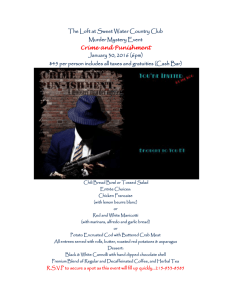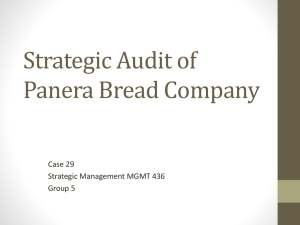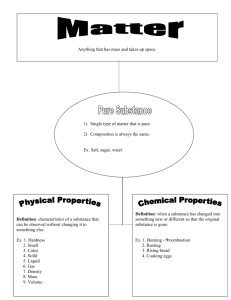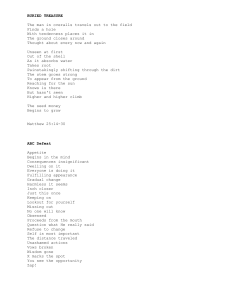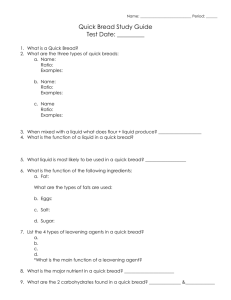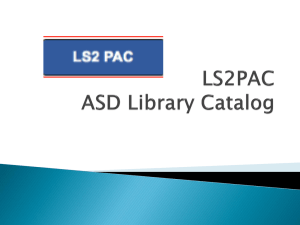Service for World Food Sunday
advertisement
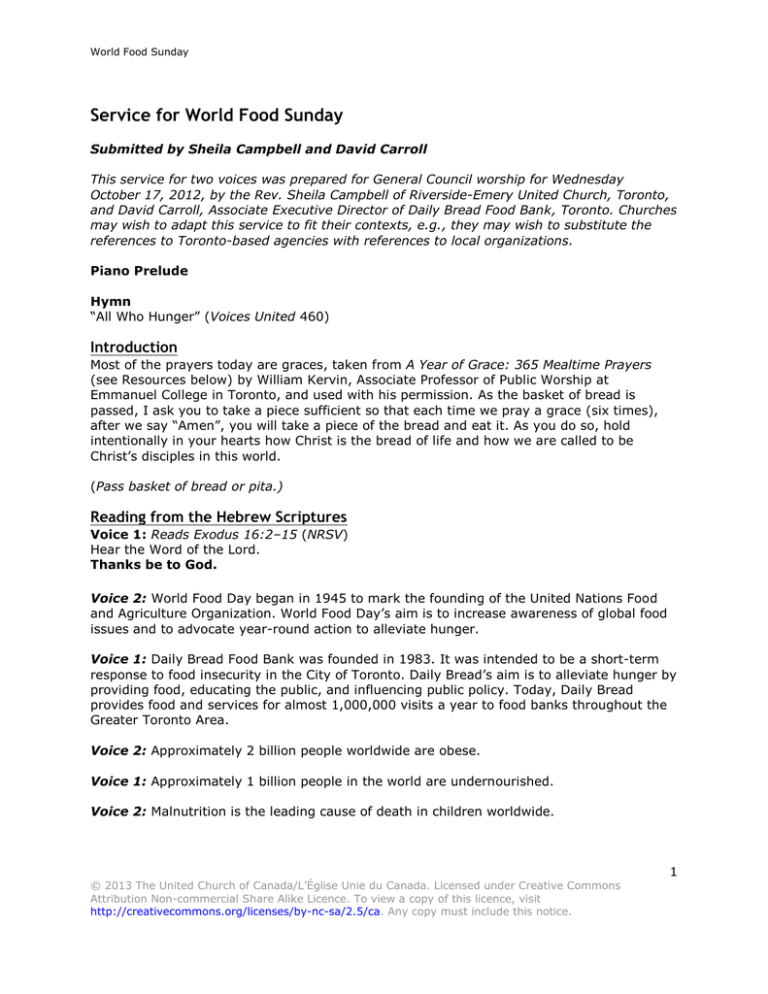
World Food Sunday Service for World Food Sunday Submitted by Sheila Campbell and David Carroll This service for two voices was prepared for General Council worship for Wednesday October 17, 2012, by the Rev. Sheila Campbell of Riverside-Emery United Church, Toronto, and David Carroll, Associate Executive Director of Daily Bread Food Bank, Toronto. Churches may wish to adapt this service to fit their contexts, e.g., they may wish to substitute the references to Toronto-based agencies with references to local organizations. Piano Prelude Hymn “All Who Hunger” (Voices United 460) Introduction Most of the prayers today are graces, taken from A Year of Grace: 365 Mealtime Prayers (see Resources below) by William Kervin, Associate Professor of Public Worship at Emmanuel College in Toronto, and used with his permission. As the basket of bread is passed, I ask you to take a piece sufficient so that each time we pray a grace (six times), after we say “Amen”, you will take a piece of the bread and eat it. As you do so, hold intentionally in your hearts how Christ is the bread of life and how we are called to be Christ’s disciples in this world. (Pass basket of bread or pita.) Reading from the Hebrew Scriptures Voice 1: Reads Exodus 16:2–15 (NRSV) Hear the Word of the Lord. Thanks be to God. Voice 2: World Food Day began in 1945 to mark the founding of the United Nations Food and Agriculture Organization. World Food Day’s aim is to increase awareness of global food issues and to advocate year-round action to alleviate hunger. Voice 1: Daily Bread Food Bank was founded in 1983. It was intended to be a short-term response to food insecurity in the City of Toronto. Daily Bread’s aim is to alleviate hunger by providing food, educating the public, and influencing public policy. Today, Daily Bread provides food and services for almost 1,000,000 visits a year to food banks throughout the Greater Toronto Area. Voice 2: Approximately 2 billion people worldwide are obese. Voice 1: Approximately 1 billion people in the world are undernourished. Voice 2: Malnutrition is the leading cause of death in children worldwide. 1 © 2013 The United Church of Canada/L’Église Unie du Canada. Licensed under Creative Commons Attribution Non-commercial Share Alike Licence. To view a copy of this licence, visit http://creativecommons.org/licenses/by-nc-sa/2.5/ca. Any copy must include this notice. World Food Sunday Voice 1: Our children are the first generation in history whose life expectancy is less than our generation, and it’s due to food insecurity. Voice 1: Let us pray: Let us break bread, praying that the kingdom of God may break into our world. Let us pour wine, praying that God’s justice will roll down like an ever-flowing stream. And let us open our hearts to behold this promise and open our hands to share it. Amen. (365 Graces #16, William Kervin) (Share bread.) Voice 1: Food prices have been under greater pressure in recent years as grains that are typically used to feed people and stock animals are used to produce ethanol to be added to gas. Voice 2: Climate change is putting additional pressure on agricultural lands. The Peruvian highlands are experiencing a 25 percent shorter growing season than they did a decade ago. Voice 1: A quarter of the people who use a food bank in the Greater Toronto Area are university graduates Voice 2: Of adults who use food banks, 39 percent of them have not eaten for a whole day because of lack of money. Voice 1: Of the adults who use food banks, 45 percent of them go hungry at least once per week because of lack of money. Voice 2: Children make up 32 percent of food bank clients. Voice 1: Let us pray: For the hands around this table remind us of hands that weed the fields and tend the livestock and haul the nets; hands that pack the boxes and load the trucks and stock the shelves; hands that work where we do not, like the very hands of God. For this and so much more, we are deeply thankful. Amen. (365 Graces, #23 William Kervin) (Share bread.) Voice 1: For people who use food banks, the median monthly income is $691. Voice 2: The average food bank client has $5.83 per day left after they pay rent. Out of this money, they have to buy food, personal care products, travel to the food bank, and simply live. Voice 1: The average food bank client pays 71 percent of their household income on rent. Spending more than 51 percent of household income on rent puts one at severe risk of homelessness. Voice 2: Canadians waste approximately 40 percent of all our food, valued at $27 billion. 2 © 2013 The United Church of Canada/L’Église Unie du Canada. Licensed under Creative Commons Attribution Non-commercial Share Alike Licence. To view a copy of this licence, visit http://creativecommons.org/licenses/by-nc-sa/2.5/ca. Any copy must include this notice. World Food Sunday Voice 1: Half of the food that is wasted in Canada gets tossed out by households. The remainder comes from food retailers, restaurants, and food processing facilities. Voice 2: The average portion sizes have increased dramatically over the past century. French fry serving sizes are 50 percent bigger than 25 years ago. Twenty years ago, two slices of pizza were 500 calories. Today, they’re 850 calories. Twenty years ago a standard coffee with cream and sugar was 45 calories. Today, a Starbucks Grande café mocha with whipped cream and 2 percent milk is 330 calories. Voice 1: In North America, we think food is cheap. For most of us, we simply buy more food when we want to. And there’s little to encourage us to change our attitudes and behaviours about throwing out food. Voice 1: Let us pray: Holy Wisdom, Creator Spirit, thank you for this food and keep us always aware of our humble place in your web of life. Thank you for the countless blessings that come through your plants and animals, offering us fullness of life in body and in spirit. Open us to receive such grace with mindfulness and humility, that we may live with respect in creation and know peace with all that lives. Amen. (365 Graces, #149, William Kervin) (Share bread.) Voice 2: But some people are doing something. In Britain, they have a program called WRAP that stands for “Waste and Resources Action Program,” a not-for-profit organization that recently launched an anti-waste campaign. Voice 1: Since 1985, Second Harvest in Toronto has been picking up donated, excess food that would otherwise go to waste and delivering that food to community agencies. Currently, Second Harvest delivers rescued food to over 215 community agencies. Voice 2: Second Harvest operates a food recovery program in Toronto and is a major provider of fresh food to people in need. They have delivered over 7 million pounds of food in the last 12 months. All their food is donated by local food retailers, manufacturers, restaurants, caterers. This is food that would otherwise be thrown out. Children and youth represent almost 40 percent of their food recipients. Voice 1: Reads Matthew 14:13–21 (NRSV). For the word of God in scripture, for the word of God among us, for the word of God within us, Thanks be to God. Hymn “You Satisfy the Hungry Heart” (Voice United 478) Voice 1: Let us pray: Forgive us, Lord. Forgive us for not sharing the bread that you have given us. Forgive us for not seeing the hands outstretched calling out for bread, and for not recognizing them as yours. Forgive us for thinking that this is our bread and not your bread, Lord. Forgive us for not sharing the bread of life that you have given us. 3 © 2013 The United Church of Canada/L’Église Unie du Canada. Licensed under Creative Commons Attribution Non-commercial Share Alike Licence. To view a copy of this licence, visit http://creativecommons.org/licenses/by-nc-sa/2.5/ca. Any copy must include this notice. World Food Sunday Forgive us for not seeing the arms outstretched seeking to find meaning in life and not recognizing them as yours. Forgive us for not living the Good News that we have received, that others may too share in the bread of life with which we have been blessed. Forgive us for not sharing the living vine that you have given us. Forgive us for not seeing the open hearts that call out to be loved and cherished, and for not recognizing you. Forgive us for not loving as you have loved us. Bless us with courage to do your will, faith to endure the journey, and love with which to embrace all our brothers and sisters. For thine is the kingdom, Lord, on heaven and on earth, and to you, be the glory. (Sheila Campbell) (Share bread.) Voice 2: The good news is that there are things we can do to help reduce how much food we waste. Make a grocery list to help avoid impulse buying. Voice 1: Don’t shop when you’re hungry. Voice 2: Serve smaller portions. Voice 1: Clean and prepare produce before you put it in the fridge; you’re more apt to eat it. Voice 2: Freeze large portions. Voice 1: “Best before…” does not mean a mandatory throwing out after the date. Voice 2: Sniff dairy products like yogurt and sour cream to see if they’re still fresh after their best before date. But obey date stamps on products like cold cuts, sushi, soft cheeses, and baby food. Voice 1: Let us pray: Thank you, God, for blue skies above, green grass below, good friends beside, fine food in front, and peace wherever it is found. Amen. (365 Graces, #249, Celtic) (Share bread.) Voice 2: There is good news. We can live more socially conscious. Consider reading Living Me to We: The Guide for Socially Conscious Canadians by Craig and Marc Keilburger (see Resources below). Voice 1: Check out the Generation Food Project, a Fair Trade produced series of films on exciting and innovative agricultural projects from around the world. One example is how the Peruvian farmers are coping with a decreased growing season—they’re experimenting with over 300 different varieties of potatoes and, in the marketplace, they have a sliding price scale based on income, so that everyone can afford the food they need. Voice 2: Check out Daily Bread’s Community Based Research Initiatives, looking at ways to alleviate poverty and hunger. In one initiative, Daily Bread Food Bank and “Voices from the Street” seek to make a unique contribution to the debate about income security reform generating innovative ideas for change; they have developed a blueprint for how Ontario Works and Ontario Disability Support Program must change. 4 © 2013 The United Church of Canada/L’Église Unie du Canada. Licensed under Creative Commons Attribution Non-commercial Share Alike Licence. To view a copy of this licence, visit http://creativecommons.org/licenses/by-nc-sa/2.5/ca. Any copy must include this notice. World Food Sunday Voice 1: Let us pray: May the blessing of the five loaves and the two fishes be ours also. May we be counted among the five thousand who ate and drank to their fill, and yet found enough to share beyond. Amen (365 Graces, #207, Celtic) (Share bread.) Closing Hymn “Go, Make a Diff’rence” (More Voices 209) Commissioning Go, be God’s hand in the world. Go, make a difference Benediction Postlude Resources Daily Bread Food Bank website: www.dailybread.ca. Generation Food Project—Across the Table, Across the World website: http://generationfoodproject.org. Kervin, William A Year of Grace: 365 Mealtime Prayers (Hendrickson Publishers, Inc. Massachusetts, 2003). Kielburger, Craig and Marc, “How to Stop Wasting Food,” Canadian Living Magazine http://www.canadianliving.com/life/green_living/how_to_stop_wasting_food.php. Keilburger, Craig and Marc, Living Me to We: The Guide for Socially Conscious Canadians (Me to We, 2012). McGinn, Dave, “How Much in Food Do Canadians Waste a Year? Think Billions,” The Globe and Mail, Monday October 1, 2012. Second Harvest website: www.secondharvest.ca. Super Friends2! Food for All, World Development and Relief, Mission and Service, Children’s Resource, August 2012. (Order through UCRD, www.ucrdstore.ca.) Permission Graces are used by permission of the authors (the Rev. Dr. William S. Kervin and the Rev. Sheila Campbell) and are gratefully acknowledged, or are in the public domain . When reproducing the graces in bulletins, please give credit accordingly. 5 © 2013 The United Church of Canada/L’Église Unie du Canada. Licensed under Creative Commons Attribution Non-commercial Share Alike Licence. To view a copy of this licence, visit http://creativecommons.org/licenses/by-nc-sa/2.5/ca. Any copy must include this notice.

